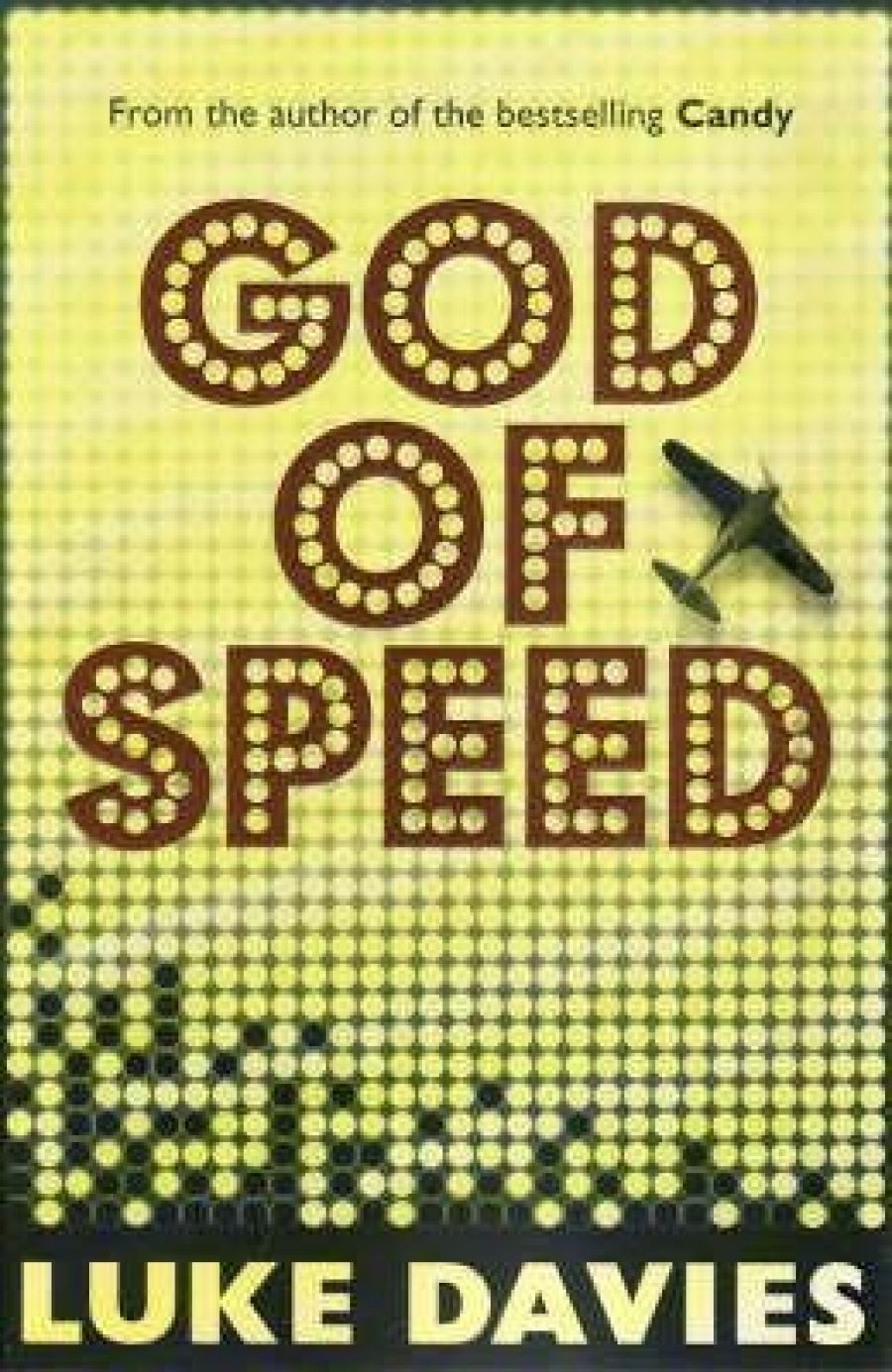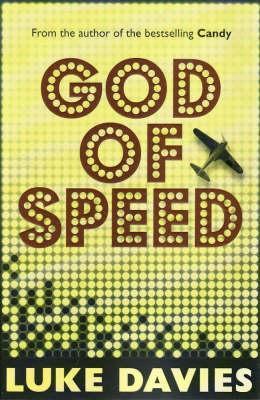
- Free Article: No
- Contents Category: Fiction
- Custom Article Title: The spellbinder
- Review Article: Yes
- Article Title: The spellbinder
- Online Only: No
- Custom Highlight Text:
The title is presumably meant to be ambiguous. Not only did the protagonist, Howard Hughes, hurtle round the world in aeroplanes of his own devising, and not only did he ingest amphetamines at a rate that would finish most of us, but there is also a sense of his crashing non-stop through life itself. And 'speed', he tells us in Luke Davies' remarkable new novel, 'shouldered some of the weight for me ... helped me maintain control over a bucking project, since, control, ultimately, is all there is.'
- Book 1 Title: God of Speed
- Book 1 Biblio: Allen & Unwin, $32.95 pb, 304 pp, 9781741143508
- Book 1 Cover Small (400 x 600):

- Book 1 Cover (800 x 1200):

Anyway, everyone should know about Luke Davies because he is, on the strength of God of Speed and his earlier novel Candy (1997), already a major figure among Australian novelists. As one who wouldn't know smack from crack, I was irresistibly drawn into the drug-driven life of Candy's young first-person narrator, and moved by its tenderness as a love story. And yes, God of Speed is a novel masquerading as a sort of autobiography; and, as in Candy, Davies is utterly inside the mind of his protagonist, the semi-deranged billionaire, wildly successful womaniser, aviator, inventor, movie-maker and, ultimately, drugged-out recluse.
Hughes, in 1973, is holed up in a London hotel where he is waiting for his old friend Jack Real (a name to conjure with) to sleep off his jet-lag, having just flown in from the United States. The novel takes shape as Hughes compiles memories of old times, of air crashes and lovers, with which to regale Jack when he wakes. It is a formal triumph as Davies organises these snapshots of . Hughes’s past, making us feel privy to some sort of autobiography in progress, while retaining a novelist's control. For all the talk of Hughes's 'control', it is really Davies' that is so impressive. The 'snapshots' aren't just arbitrary, aren't just strung one after another in the chronological order most autobiography demands. The device of having Hughes imagine what he and Jack will talk about is a novelist's invention, and it keeps us at a reflective remove from the actual events.
The flying adventures, with spectacularly evoked crash landings as well as the 1938 round-the-world exploit, are chronicled with an often astonishing sense of the sensuous thrill of being in the cockpit at great heights, or spiralling to earth when an engine has failed. The 1938 trip surfaces several times as Hughes makes landings at various stopovers, and the way the pioneer aviator deals with the pressures of flight – the physical demands it makes, and its almost orgasmic rewards – compels admiration for this madly driven 'hero'. If, your parents dead, you've inherited a huge fortune at eighteen, it must be hard to find serious challenges, and Davies persuades us that Hughes found his in flying.
The other great love of Hughes's life, at least until he started to fall apart physically, is for beautiful women; that is, for some of the most sensationally beautiful women ever brought to the world's breathless attention. Davies does as brilliantly by this aspect of Hughes's obsessiveness as by his passion for speed. The sexual appetites and proclivities of his all-star cast are lovingly distinguished the one from the other, detailed with a carnal precision that has nothing to do with pornography. Most of these beauties are dead now, but I couldn't help wondering about the possibilities of litigation from, say, Olivia de Havilland, a still lively minded 91-year-old, and what she might have to say about the reference to herself. She, after all, took on Warner Bros and won, in the matter of suspension time's being added to contract period.
Hepburn would surely have had something to say, as Davies' prose caresses her finely honed body with a rapture that seems scarcely less than that of Hughes's recollection of what his hands had been up to. Decorum forbids me to quote here how these twin processes are achieved, except to record how Hughes sums up his time with the great love of his life: 'We were like two bony whippets going at it.' There is more sense of the Hepburn-ness of the megastar in almost any sentence of Davies than there was in the 600 pages of Kate (2006), William Mann's vast – and vastly awful – biography of Hepburn. Hughes's dealings with Jane Greer, film-noir icon as she became, are symptomatic of how he viewed most of his women. However enticing they were - and the gorgeous Greer, in whose 'lips was all the ineffable essence of welcoming', was as exquisite as any – he required total subservience. 'What right had she to see other men? I made her, I owned her for now.' Some, like poor hapless Domergue, pestered him for film chances, and he didn't like that either.
What sort of man emerges from 'the cascading of memories'? A more complex one than you might think. Anyone who had the perception to notice that Hepburn was a great beauty, as well as a briskly daunting companion, had something going for him. On the other hand, note what he has to say about the lovely Gene Tierney (does anyone under fifty know who we mean?) and her husband Count Oleg Cassini. Of her, he remembers ‘there were bouquets of hyacinths hidden inside her’, but of Cassini, ‘a lowly fashion designer who should really and may well have been a fag’, he is pleased to recall ‘his greaseball macho pride’ and speaks of their handicapped child as ‘a retard’. He was perfectly vile in all sorts of manipulative ways, solipsistic to the nth degree, racist, insanely obsessive about planes, woman and germs, but, as Davies creates/recreates him, a riveting raconteur and a spellbinding risk-taker. He wanted the whole world and came nearer to achieving that goal than almost anyone ever has; and he became a control freak, firing off memos to ensure that the world, or at least part of it he knew, marched to his drum.
The novel's brief chapters are interspersed with these memos. The sequence of memories is not merely haphazard; there are sometimes verbal links between the end of one and the start of the next that convince us about the processes of mind dramatised here. For instance, one 'snapshot' ends with his screaming about Frank Sinatra, 'Let me talk to the bastard! Lemme get my hands on him', Sinatra having had his hands on Ava Gardner. The next slab of memory begins, 'No, I couldn't see what Gardner saw in him. Let alone why she would marry him. Because Sinatra was a greaseball.' Davies is fascinated by all sorts of things about Hughes, not just by the complex, unlovable individual he reveals him as being. As well, Hughes commands attention for what he incarnates about the seemingly endless possibilities of the twentieth century, and, resonating out further still, for the extraordinary capacity of great wealth to corrupt and deaden the moral sense.
God of Speed is an Australian novel that has nothing to do wit the specificities of Australia. It is, though, a tour de force, and you can’t often say as much about a novel from any source. I am eager for Davies’ next book, even if it’s about the excitements of double-entry accounting.


Comments powered by CComment